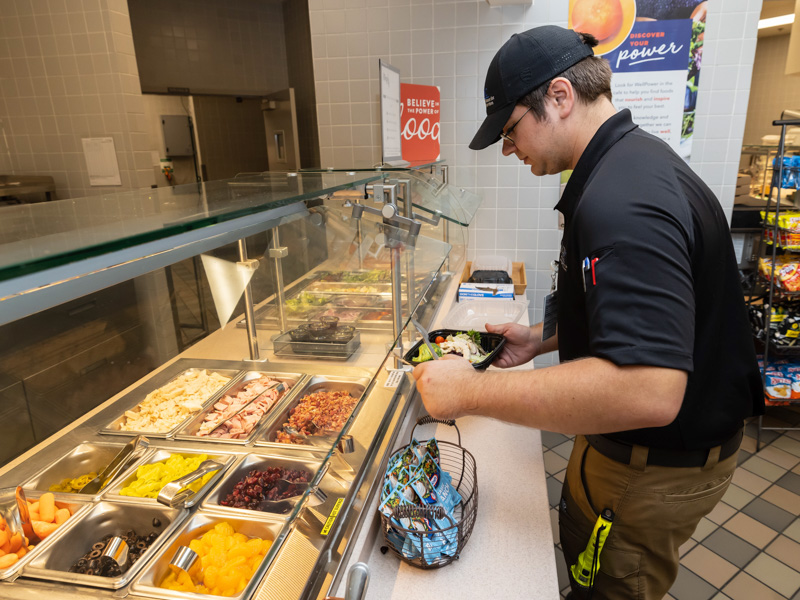Mindful eating based on awareness of what your body needs

You’re at the hours-long tailgating before the big game, sitting in a bag chair next to the long food table that’s a festive free-for-all.
You eat, but are you hungry? You take a spoon of the seven-layer dip that you’ve never liked. Between all the conversations, you don’t remember picking up the fried chicken tender on your plate.
You eat the cupcake you’ve been eyeing for an hour, and your guilt over the calories ruins the fun.
Being a mindful eater, however, allows you to consume what’s in line with your values about your health. It’s being aware of your eating habits, and basing them off your physiological needs rather than what’s going on around you.

“Mindful eating is about taking the judgment away from food, and getting away from a diet mindset,” said Dr. Elena Dent, an assistant professor in the Department of Preventive Medicine.

“Being mindful about eating is not about eating the right thing or the wrong thing, or eating a good thing or a bad thing,” said Dr. Danny Burgess, associate professor in the Department of Psychiatry and Human Behavior. “What can be a problem with ‘eating right’ is that there’s the assumption of ‘eating wrong.’
“When you’re trying to eat right, you may be following strict criteria or requirements that suggests you eat these foods and stay away from other foods. That’s not what mindful eating is about.”
Mindful eating is based on what your body needs, not emotions or external cues and triggers, Burgess said. And in the Deep South, there are triggers a’ plenty that can drive what we eat, when we eat it and how much.
“Especially here in the South, food is associated with social activities, family events, church events – any time where we have gatherings. There’s always a food component to it,” Burgess said. “We associate a good time with friends with something that should include food.”
It’s easy to eat, and to overeat, without giving it a lot of thought because of the distractions around you. “Our eating habits are determined by external triggers rather than by paying attention to the body’s own wisdom on what we should eat and how much,” Burgess said.
That’s not to say you should cut “food functions” out of your day-to-day schedule, “but when you make associations with food, you start making decisions socially and emotionally, rather than based on your physical needs,” Burgess said.
Mindful eating, Dent said, “begins before you put it in your mouth. You are ultimately deciding: Am I truly hungry? What do I really want right now? Comfort? Distraction? To not be bored?
“Part of mindful eating is slowing down, taking a breath and pausing before you eat,” Dent said. She suggests resisting the temptation to wolf down your food, and instead, investigate it by mindfully chewing it and savoring it.
“Assess how you’re feeling,” she said. “If you’re having an experience with food, is what you’re eating satisfying what you’re truly hungry for? The biggest difference between mindful eating and other healthy eating approaches is that it’s addressing your relationship with food. It’s the longest relationship most of us have ever been in.”
Burgess and Dent offer tips to help you eat mindfully:
- Don’t deny yourself. “If we go into a family gathering or party and tell yourselves beforehand that you can’t have something because it’s bad, then when we get there, it’s more enticing than it already is,” Burgess said.
“We see other people eating it, so we begin to justify it, and we overindulge. We mindlessly eat, and before we know it, we’re uncomfortably full,” he said.
Instead, “tell yourself that you’re going to go into it focusing on what my body wants and how much of it,” Burgess said. “Do this before the party or gathering, not when you get there. Don’t restrict yourself, but pay attention to your biological hunger, not what’s going on in your environment.”
- Before you go, Dent suggests you ask yourself: Am I looking forward to it? Is food part of it? When I go to parties, am I stressed about the food? About what I eat?
Then, set parameters. “Say: I know that my favorite pie will be there, and I’m going to eat an appropriate amount and not feel guilty about the calories,” Dent said. “Then, move on.
“You didn’t eat the whole pie. Learn to give yourself permission and to trust yourself with food, and to let food do its job of providing nutrition.”
- If you worry you’re going to overeat, “have a sensible meal before you go so that you can take care of that biological hunger,” Burgess said. “You can go into it already prepared to reduce the temptation of wanting to overeat.”
- Practice learning mindfulness through routine scenarios so that when it comes to eating, you have skills in place. “I tell patients I’m working with to practice mindful skills on things like brushing their teeth, or taking a shower,” Burgess said.
“If you take a mindful approach to eating, you realize how distracted you have been, or how you didn’t take the time to savor and enjoy your food,” he said. “If you make the time to do that, you might say, well, I didn’t like this food as much as I thought.’
“You will begin to make decisions that are mindful and intentional, rather than eating what’s in front of you.”


